Top 5 Longest Bridges In Nigeria
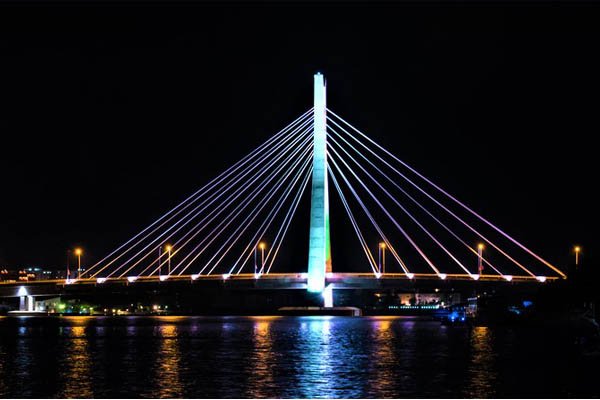
Bridges, those marvels of engineering, have long stood as symbols of human ingenuity and progress, spanning both physical gaps and metaphorical divides. From ancient stone arches that whispered stories of civilizations long past, to modern steel giants that link continents, bridges serve as more than just pathways; they bridge cultures, economies, and ideas. This article delves into the fascinating realm of bridges, tracing their evolution from rudimentary crossings to intricate works of artistry and functionality.
Throughout history, bridges have been instrumental in reshaping the landscapes of societies. Ancient civilizations strategically placed stepping stones across rivers, slowly developing the notion of bridging physical gaps. As time progressed, timber gave way to stone, and the construction of magnificent arches like the Pont du Gard showcased the mastery of Roman engineers.
Fast forward to the present day, and the world has witnessed unprecedented feats of engineering in the form of suspension, cable-stayed, and cantilever bridges. These awe-inspiring structures not only facilitate seamless transportation but also stand as iconic landmarks, representing the aspirations and achievements of their respective regions.
Beyond their utilitarian function, bridges have an undeniable cultural and symbolic significance. They serve as connections not just between two points, but between people, traditions, and ideas. The intertwining cables of a suspension bridge mirror the interwoven fabric of diverse societies. Moreover, bridges often become backdrops for shared experiences, from romantic strolls to bustling marketplaces.
As we explore the intricate details of bridge construction, delve into the stories of remarkable bridges around the world, and uncover the impact of these structures on economies and societies, one truth becomes evident: bridges are conduits of progress. They transcend physical barriers, foster connections, and bridge the past with the present, embodying the unyielding spirit of human innovation.
Top 5 Longest Bridges in Nigeria
- Third Mainland Bridge, Lagos
- Second Niger Bridge
- Lekki-Ikoyi Link Bridge, Lagos
- Niger Bridge, Onitsha/Asaba
- Eko Bridge, Lagos
1. Third Mainland Bridge, Lagos
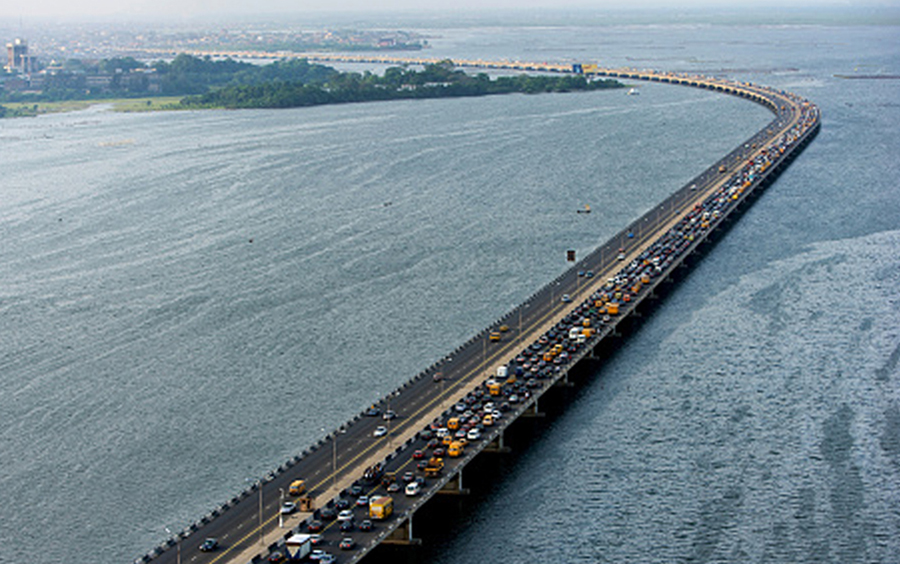
READ ALSO » Top 10 Longest Bridges In The World 2024
Stretching across the Lagos Lagoon, the Third Mainland Bridge stands as a lifeline for the bustling metropolis of Lagos, Nigeria. With a length of approximately 11.8 kilometers, it's one of the longest bridges in Africa. Connecting Lagos Island to the mainland, this concrete marvel not only eases the flow of daily commuter traffic but also plays a vital role in the region's economy. Its construction in 1990 marked a significant step forward in Nigeria's infrastructure development, enhancing connectivity and fostering urban growth.
2. Second Niger Bridge
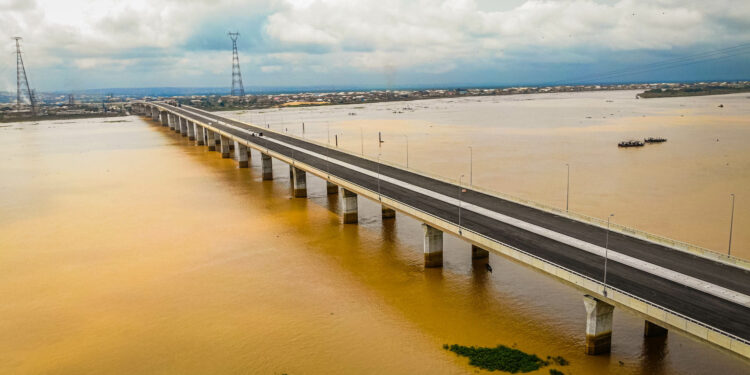
The Second Niger Bridge is one of the longest bridge in Nigeria, spanning over a length of 1.63 km (1.01 mi). As you would guess, the bridge is located in Onitsha just directly opposite the River Niger Bridge with some kilometers between them. Construction of the Second Niger Bridge began in September 1, 2018 and it was opened to local traffic on December 15, 2022. Second Onitsha Bridge was completed under the administration of President Buhari presidency, a project which masterplan had been delivered during the regime of General Ibrahim Babangida.
3. Lekki-Ikoyi Link Bridge, Lagos
The Lekki-Ikoyi Link Bridge, a cable-stayed wonder, serves as a vital connection between the bustling commercial district of Ikoyi and the rapidly developing Lekki Peninsula. Spanning about 1.36 kilometers, this elegant bridge not only offers a quicker route for commuters but also provides a picturesque view of the Lagos Lagoon. Its sleek design and aesthetic appeal have turned it into a symbol of contemporary infrastructure in Nigeria. Opened to the public in 2013, the Lekki-Ikoyi Link Bridge stands as a testament to the nation's aspiration for modernity and progress.
4. Niger Bridge, Onitsha/Asaba
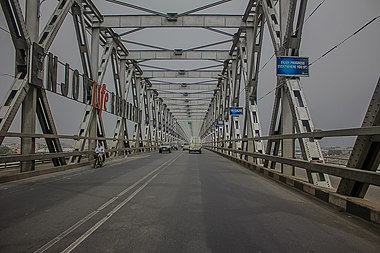
The Niger Bridge, a testament to engineering ingenuity, spans the mighty Niger River, connecting the cities of Onitsha in Anambra State and Asaba in Delta State. With a history dating back to its original construction in the 1960s, this bridge has undergone multiple phases of expansion and renovation to accommodate growing traffic demands. The Niger Bridge plays a crucial role in linking Nigeria's southeastern and southwestern regions, facilitating trade and cultural exchange. Its significance extends beyond its utilitarian function, as it serves as a symbolic link between different ethnic groups and historical narratives.
5. Eko Bridge, Lagos
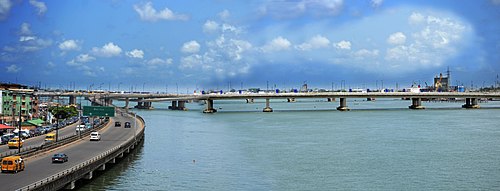
As one of Lagos' iconic landmarks, the Eko Bridge stands as a testament to the city's growth and evolution. This steel truss bridge spans Lagos Lagoon, connecting Lagos Island to the mainland. Opened in 1975, the Eko Bridge has played a pivotal role in the city's development by improving accessibility and easing traffic congestion. With its stunning views of the Lagos skyline and waterfront, the bridge has become a backdrop for countless snapshots of the city's vibrancy. The Eko Bridge is not just a physical connection; it represents the aspirations of Lagos and its people, embodying the dynamism and resilience that characterize Nigeria's largest city.
In conclusion, bridges transcend their physical presence to embody the very essence of human progress and connectivity. From the ancient stone arches that whispered stories of bygone civilizations to the modern engineering marvels that seamlessly link urban landscapes, bridges have consistently served as conduits of change. They bridge not only physical gaps but also cultural divides, symbolizing unity and shared aspirations.
As we marvel at the engineering feats behind these structures, it's essential to recognize their broader significance. Bridges foster economic growth, facilitate social interactions, and catalyze urban expansion. They stand as witnesses to the evolution of societies, reflecting the ingenuity and determination of generations. Beyond their utilitarian function, bridges become part of the collective memory, shaping narratives and influencing the identities of the regions they connect.
READ ALSO » Top 10 Most Longest Bridges In Africa
The story of bridges is not just about concrete and steel; it's about the human spirit's drive to conquer challenges and connect worlds. As new bridges rise and existing ones continue to evolve, they remind us that, in the face of geographical barriers and diverse cultures, the human instinct to build bridges endures, lighting the way for a more connected and unified future.
